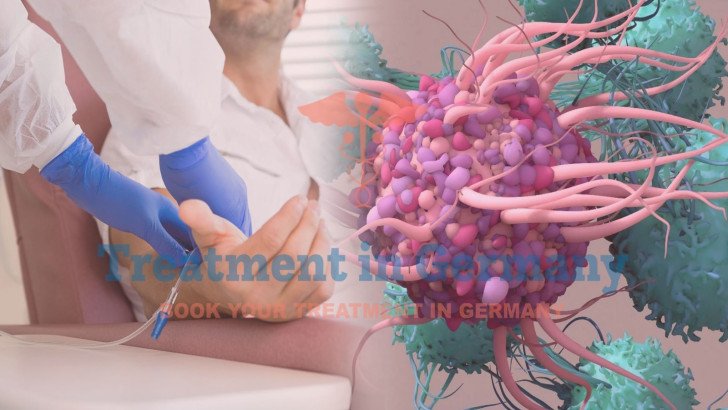
Dendritic cell-based immunotherapy is the administration of individually manufactured vaccines based on the genetic characteristics of a tumor in a particular person.
The integration of chemotherapy with dendritic cell therapy, a form of cell-based immunotherapy, represents a strategic approach to enhance cancer treatment outcomes by combining cytotoxic tumor reduction with immune system activation. In cancer treatment, this synergistic method is meticulously implemented by doctors, including German oncologists, within state-of-the-art hospitals.
Cancer, with over 500,000 annual diagnoses in Germany, is influenced by risk factors such as obesity, diabetes, high cholesterol, and autoimmune diseases. Chemotherapy, a cornerstone of cancer management, uses cytotoxic agents to target rapidly dividing cells, achieving 30-60% response rates in cancers like breast and colorectal but often at the cost of significant toxicity.
Dendritic cell therapy, by contrast, primes dendritic cells to stimulate T-cell responses, offering 20-40% response rates for solid tumors like melanoma and lung cancer with minimal side effects. Unlike CAR-T cell therapy, which excels in blood cancers, this combination leverages chemotherapy’s tumor-debulking capacity and dendritic cell therapy’s immune-enhancing effects. Hospitals pioneer this approach, improving cancer therapy, per latest research.
Dendritic cell therapy activates the immune system through a targeted process:
This mechanism, refined in hospitals, complements chemotherapy’s direct tumor-killing action, enhancing personalized treatment.
Mechanism of Chemotherapy
Chemotherapy employs cytotoxic drugs to disrupt cancer cell proliferation:
In cancer treatment, chemotherapy is strategically dosed to synergize with immunotherapy, per latest research.
Synergistic Effects of Integration
The combination of chemotherapy and dendritic cell therapy amplifies therapeutic efficacy:
German oncologists optimize these synergies, advancing innovative cancer treatments.
Clinical Applications Across Cancers
This integrated approach is versatile, particularly for solid tumors:
Hospitals tailor these applications, broadening cancer treatment options.
Safety Considerations of Combined Therapy
The combination balances efficacy with a tolerable safety profile:
This contrasts with CAR-T cell therapy’s 20-40% risk of severe cytokine release syndrome, highlighting the combination’s patient-centric design.
Role of Complementary Therapies
Complementary therapies mitigate treatment effects and support recovery:
Hospitals integrate these therapies, ensuring holistic cancer therapy.
Comparison to Other Immunotherapies
The combination differs from CAR-T cell therapy and standalone immunotherapies:
These distinctions guide German oncologists in delivering innovative cancer treatments.
Challenges and Limitations
The integrated approach faces several challenges:
Germany’s 130+ annual trials address these issues, advancing cancer treatment options, per latest research.
Future Directions
Ongoing research is refining the combination:
These advancements solidify hospitals as leaders in innovative cancer treatments.
Conclusion
Integrating chemotherapy with dendritic cell therapy offers a robust strategy for treating solid tumors, combining tumor reduction with immune activation to improve clinical outcomes. Administered by German oncologists in premier hospitals, it incorporates complementary therapies to enhance quality of life. As latest research propels innovation, this cell-based immunotherapy and cytotoxic approach exemplify personalized treatment in cancer therapy.
FAQS
How does chemotherapy enhance dendritic cell therapy?
Chemotherapy reduces tumor mass, boosting dendritic cell therapy’s immune response in cancer treatment.
Which cancers are treated with this combination?
Solid tumors like NSCLC and melanoma benefit, per innovative cancer treatments.
Is the combination safe?
Mild side effects are managed by doctors, ensuring safety in cancer therapy
How effective is this integrated approach?
It achieves 20-40% response rates, improving PFS in cancer treatment options.
Can it be paired with other treatments?
Targeted therapy enhances outcomes, optimized in hospitals for personalized treatment.
How lng does the treatment take?
Spans multiple cycles over weeks, tailored by German oncologists.
What side effects occur?
Mild nausea and fatigue, minimized in cancer therapy in Germany, resolve quickly.
How does it compare to CAR-T cell therapy?
More effective for solid tumors than blood cancers, per cell-based immunotherapy research.
Are clinical trials available?
Yes, trials advance innovative cancer treatments for combined therapies.
Why choose Germany for this treatment?
Germany excels in personalized treatment, led by expert doctors and hospitals.
For further information, visit our contact us page.
Kindly complete the form below, and our dedicated team will reach out to you promptly. We look forward to connecting with you soon!
Trierer Straße, 56072 Koblenz, Germany

.webp)
 (1).webp)

.webp)
 (1).webp)


.webp)
 (1).webp)

.webp)
 (1).webp)
